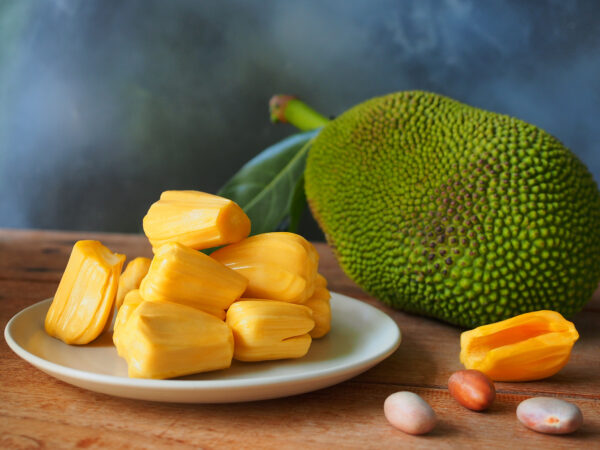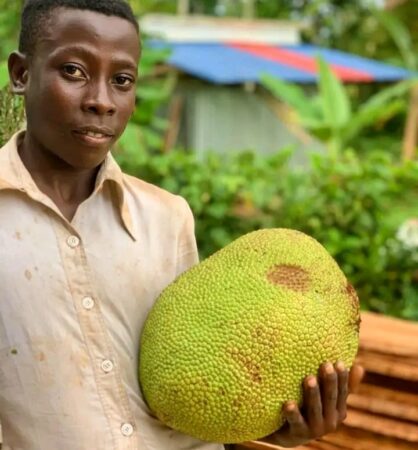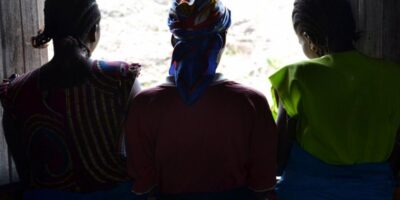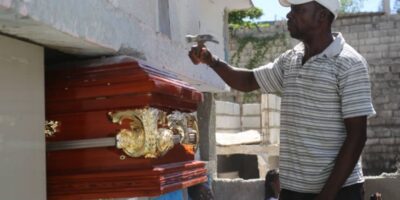“If there is no action plan developed to raise awareness and make people understand its importance, in ten more years we risk losing the species,” predicts botanist Cebe Kalule
Coconut palms, lime, taro (mazonbèl), cassava or the local coffee called “arabica typica”… the list of endangered plants was already long in Haiti.
However, it must now include the jackfruit, nicknamed “Jaca,” as several agronomists point out to AyiboPost.

A jackfruit, and its fruit (Jaca). | © Pada Smith
This large, juicy and sweet fruit, once found in abundance in the Grand’Anse department, has become scarce in the region at least since the violent passage Hurricane Matthew in 2016.
The indomitable wings of the cataclysm caused $2.8 billion in damage, devastating fields, bending trees and throwing tens of thousands of people in the area out of work.
“In the third communal section of Désormeaux in Dame-Marie where I grew up, almost all the large trees, including the jackfruits, have succumbed,” Wesnel Jean-Louis told AyiboPost.
The small town of Divaraine where the man lives today had around 10 jackfruit trees, but “the majority were knocked down by the wind.”
Read also: Haiti, a sanctuary for endangered endemic birds
This fruit native to India and Bangladesh was once abundant in regions like Dame-Marie, Moron, Chambellan and Anse d’Hainault.
In the third communal section from Désormeaux to Dame-Marie […], almost all the large trees, including the jackfruits, have succumbed.
Jean Widal Fanor, Agricultural Engineer, working for 26 years in the Grand’Anse department, highlighted the lack of in-depth research on these declining crops.
“Since Matthew’s devastating passage through the Deep South, no in-depth study has been undertaken,” laments the specialist.
Scientifically known as Artocarpus heterophyllus, Jackfruit comes from the Moraceae family, just like the breadfruit or true tree.
Originally from Southeast Asia, this exotic fruit was introduced to Haiti several centuries ago. It is consumed once ripe and in portions.
The weight of the “jaca” ranges between 10 and 30 kg, with a length of approximately 40 cm and a diameter of approximately 15 cm. It contains a pulp with seeds the size of a chestnut, appreciated by some roasted or boiled.

A person carrying a “jaca”. | © Agriculture Grand’Anse, Haiti
Kalule Cebe, a botanist, says jackfruit is harvested in Haiti, including the Grand’Anse department, mainly from June to August. However, harvest times may vary slightly depending on weather conditions and local agricultural practices.
The rarity of the fruit raises concerns. According to Kalule, “there is no policy of development and agricultural supervision for the reproduction of Jackfruit in Haiti.”
Farmers are not involved in its replanting. And during this time, in some areas, the tree is cut down to be transformed into charcoal.
Additionally, there is little to no official data regarding jackfruit cultivation and consumption in Haiti.
Read also: The local variety of coffee disappearing in Haiti
At least two challenges to valorizing jackfruit persist.
The first relates to the insufficiency of nurseries, according to several agronomists interviewed by AyiboPost.
The second concerns the absence of solid demand. This is the experience of the Au Secours Agrovet farm in Grand’Anse, in operation since 2012.
“When we have the seedlings, we encounter difficulties in selling them due to low demand,” the institution’s production manager, Anisto Louïs-Charles, told AyiboPost.
There is no agricultural development and supervision policy for the multiplication of jackfruit in Haiti.
Some specialists appeal to the State. “If there is no action plan developed, whether with the government, producers or consumers, to raise awareness and make people understand its importance, in 10 more years we risk losing the species,” alerts agronomist Kalule.
Many do not know: jackfruit is rich in vitamins, minerals, phytonutrients and proteins.
This is why Fredo Jean, a farmer in Dame-Marie, takes great care of the two specimens present in his yard. For him, these trees have inestimable value. According to Jean, “some might cut them down to make charcoal, but I cherish them. And when they produce fruit, people flock to buy them from me.”
English translation by Sarah Jean.
Cover image edited by AyiboPost showcasing the Jackfruit. | © Photos : Grown in Haiti/Facebook
Watch this explanatory video from AyiboPost on this delicious fruit that is the Jacque apple (djaka in Haitian Creole):
Keep in touch with AyiboPost via :
► Our channel Telegram : Click here
► Our Channel WhatsApp : Click here
► Our Community WhatsApp : Click here







Comments